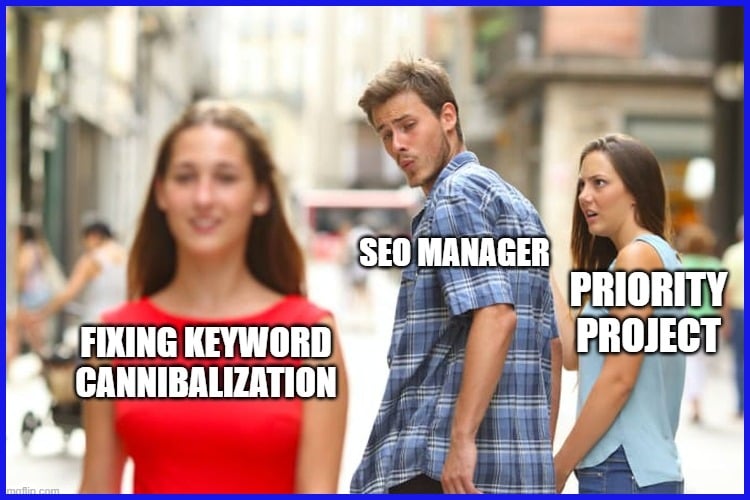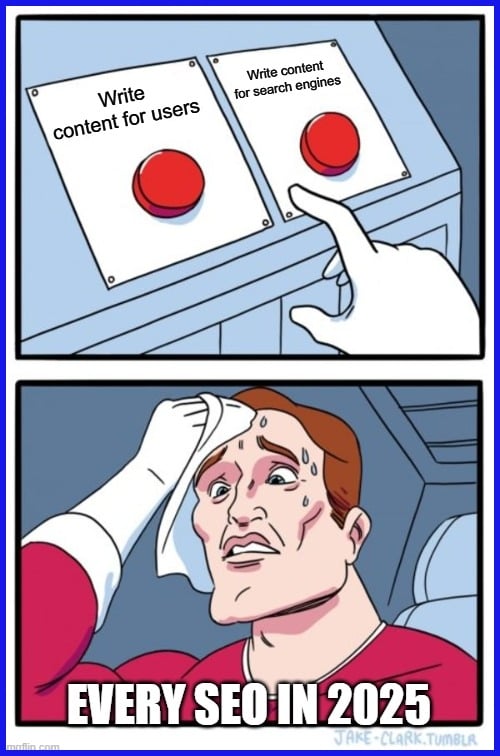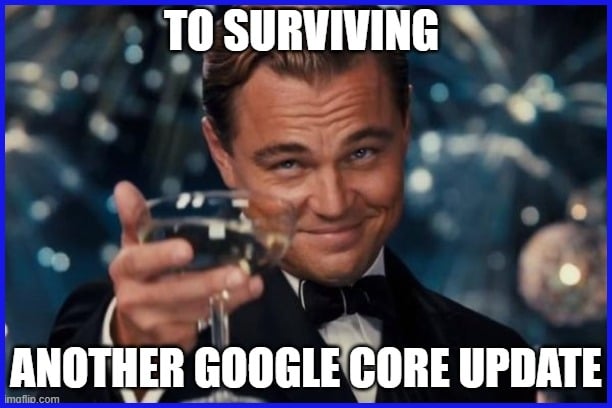Key Takeaways
-
SEO memes are essential for community-building, empathy, and collaboration among digital marketers worldwide, humanizing technical work that would otherwise feel cold and exclusive.
-
Funny SEO memes make complex things easy, and learning and sharing knowledge more accessible and enjoyable to both novices and seasoned professionals.
-
SEO memes can boost morale, foster a healthy work culture, and instill tenacity in the face of industry or algorithmic disruptions.
-
Memes are a tactical asset for brands to be heard, seen, and engaged, but also a way for brands to speak in a human and relatable voice.
-
Marketers must be aware of cultural differences and brand alignment when leveraging memes, as misinterpreted or poorly timed memes can damage brand credibility.
-
The key to producing killer SEO memes is knowing your audience’s pain points, being willing to experiment with formatting, and explaining clear context so your memes have wide-reaching resonance.
SEO Memes 2025 capture the ever-evolving humor of digital marketers navigating the wild world of search. From jaw-dropping algorithm updates to the awkward charm of keyword research, these memes turn industry headaches into laugh-out-loud moments. They’re not just funny—they spark conversations, unite SEO pros, and offer a fresh, witty take on the challenges (and triumphs) of ranking in today’s SERPs. Dive in and see how the SEO community is laughing its way through 2025.
List of Best SEO memes marketers need to see
SEO memes have become more than just a brief laugh on social media—they are the virtual adhesive for the search marketing world. They reflect the shared hustle, highlighting everything from the manic fluctuations of Google algorithm updates to the humble delight in an unexpected surge of organic traffic.
Marketers worldwide nod along, be it a meme about breaking down “what is SEO” to a client who still expects to rank #1 next week, or the old standby of refreshing the analytics dashboard for the 10th time that hour. These memes reveal universal truths, establishing a bond of solidarity and empathy so rare in any profession.
What makes the funny in SEO memes is that they focus on the shared pain—like attempting to understand the newest ranking factors, or the panic of a client deadline. A favorite meme format features a marketer’s face when a client asks, ‘Can you rank me by tomorrow?’ or mocks the notion that SEO is a one-and-done, not a marathon.
These pictures and punchlines are not simply humorous—they are cathartic. They capture the stress, the late nights, and the joy when a campaign just clicks. For others, these memes provide a secure means to blow off steam, aware that they’re not the only ones encountering never-ending transition and perplexity.
20 Best SEO Memes in 2025
1. The “Small Update” That Destroys Rankings
2. AI Content vs. Human Content
3. The Client Who Wants Overnight Rankings
4. Keyword Cannibalization Trap
5. Link Building Pain
6. Core Web Vitals Never End
7. Featured Snippets = Free Work for Google
8. The Reporting Struggle
9. The Content Refresh Dilemma
10. The Eternal “SEO is Dead” Meme
11. Google’s Helpful Content Update
12. Ranking for the Wrong Keywords
13. SEO Tools Pricing
14. Explaining SEO to Non-Marketers
15. Ranking #2 Forever
16. The Endless Content Grind
17. Google’s Secret Ranking Factors
18. Traffic Without Conversions
19. The “SEO Takes Time” Reality
20. Google SERP Layout in 2025
The Psychology of SEO Humor
Humor is more than a diversion for digerati–it’s a means of catharsis, bonding, and innovation. In the unforgiving SEO trenches where search engines pivot on a whim and clients demand magic, memes have become a pressure valve.
Studies indicate that humor diminishes stress, enhances concentration, and even improves memory. In digital marketing, laughter likewise feeds innovative cognition, making room for original strategies and surprise solutions. When brands employ memes to elucidate technical concepts, they render the information more accessible, more memorable, and more shareable.
This approach not only humanizes the brand but also encourages emotional contagion: users are more likely to engage with content that resonates on a personal level.
Shared Pain
Every SEO expert knows the sting of a ranking drop or the puzzling nature of an unexpected algorithm update. Memes that satirize these collective struggles—like the popular funny marketing memes “Google Core Update Survivors Club” or “when you finally make page one, then Penguin stops by”—reflect the industry’s communal ache. They tear down walls, encouraging marketers to giggle at their wounds.
When humor illuminates universal annoyances, it provides a feeling of camaraderie among SEO professionals. Rather than feeling isolated, SEOs discover they belong to a community. The clever SEO memes about keyword cannibalization or the hilarious pursuit of niche, authoritative backlinks allow for authentic conversation.
Niche Jokes
Not all SEO humor lands. Customized memes—think “My backlinks bring all the bots to the yard”—resonate with the people in the trenches, differentiating a brand in a noisy marketplace. These inside jokes create familiarity and trust within specialized communities, like technical SEOs or content strategists.
A brand creating niche humor demonstrates to its audience that it knows their specific pain points, be it schema woes or local pack glitches. These aimed chuckles build allegiance and encourage return visits.
Humanizing Tech
SEO can seem like a tangle of acronyms and metrics. Humor makes this complexity accessible–imagine memes that transform “canonicalization” into “getting Google to pick your favorite kid.
When geekspeak gets a humorous twist, it’s more accessible for both insiders and outsiders. Memes help demystify SEO, bridging gaps between teams and clients.
This humorous tactic promotes openness and education, while strengthening a brand’s genuineness and humanness.
Memes as a Strategic Asset
Memes are emerging as the secret sauce for digital marketers in 2025. Their potential to ignite engagement, build community, and express brand personality puts them in a category far beyond traditional graphics or copy. Making them a vital part of digital marketing strategies.
Internal Teams
So a robust internal culture is essential for any high-flying SEO posse. Trading inside jokes or meme-bombs cuts down departmental silos and makes project discussions more laid-back and productive.
When teams laugh together, collaboration comes naturally and morale lifts, boosting productivity across the board. Memes injected into everyday chats or presentations make confusing topics clear and keep everyone entertained. A funny meme in a tech standup meeting can make boring SEO reports stick, making coworkers feel connected.
Client Relations
Flashing a well-selected SEO meme at clients can melt hard discussions about rankings or algorithm adjustments. It makes the process human — clients respond that you get their struggles and aren’t scared to chuckle along with them. This relatability builds trust and creates a positive feedback loop: clients open up more, making partnerships smoother.
Clients, therefore, feel valued and engaged, not inundated or condescended to.
By injecting some humor into otherwise mundane updates or reports, agencies demonstrate their savvy and character, helping them differentiate themselves from the competition.
Brand Voice
A distinct brand voice is about more than a logo or color scheme. By incorporating memes into your message, you demonstrate to audiences that you’re accessible, flexible, and culturally aware. With 41% of consumers anticipating brands’ involvement in meme culture and 60%+ more likely to engage with meme marketing, it’s a strategic shift, not a stunt.
The Evolution of SEO Comedy
SEO comedy has evolved from lighthearted in-jokes to a culture-shaping force. What began as a niche outlet for marketers to rant about shifting algorithms, keyword stuffing, and ever-changing Google guidelines has evolved into a universal tongue—memes that commiserate about the hustle, toast victories, and mock the madness behind the curtain.
Today, SEO memes celebrate nostalgia, tech, and super-specific situations, uniting professionals from all across the world.
Early Jokes
Early 2010s SEO comedy was not only simple but also hilarious, with funny marketing memes becoming a staple among marketers. They swapped quips on keyword density and the ceaseless pursuit of backlinks. Easy image macros — like ‘Keep Calm and Build Backlinks’ — caught the zeitgeist and showcased the humor in the SEO world.
These memes cleverly addressed core frustrations: slow website rankings, surprise penalties, and the mysteries of PageRank. Time-honored sayings such as ‘I lived through the Penguin update’ or ‘Still hanging for page one’ turned into battle cries for every SEO expert.
Those first memes built a brotherhood. They joked about actual problems, making marketers feel less isolated as they braved Google’s maze.
Algorithm Humor
Algorithm changes, of course, are the great equalizer. Every marketer has experienced the shock of an unexpected rankings drop. Memes poking fun at “the algorithm” as a capricious god or enigmatic black box introduce hilarious comic relief.
They simplify complex updates—like Panda, Penguin, or BERT—by turning them into relatable scenarios: a marketer’s shocked face or a “before and after” chart of traffic. These jokes punctuate the silliness of pursuing shifting goals.
As algorithms get even more sophisticated, comedy assists in transforming technical terms into something immediately comprehensible. It keeps the community feeling connected and makes even the scariest change seem doable.
Future Trends
By 2025, SEO memes are proving to be more than a punchline–they’re immersive. Things that toe the line between meme and mini-game sprout on socials, prompting audience engagement instead of passivity.
AI now determines meme creation, producing super-specific humor relevant to industry news or even personal user interests.
As audience preferences evolve, it’s going to be memes that generate conversation, connection, and a collective commemoration of the digital marketing madness that reigns supreme. The next evolution? AI memes that riff in real-time on news, algorithm shifts, or even a brand’s analytics dashboard, so the joke stays fresh and hyper-relevant.
The Risks of Meme Culture
Meme culture provides an easy path to resonance, but it’s a two-sided blade. Memes, especially funny marketing memes, have a remarkable way of magnifying brand reach and fostering a sense of playful engagement, but they pose specific dangers for digital marketers, particularly in SEO strategies. Flash trends, fuzzy boundaries between jokes and damage, and worldwide audiences make for a messy environment. Any brands that are staking too much on memes for their SEO optimization might have their reputation, connection, and credibility on the line.
Misinterpretation
Clear meme messaging, after all, isn’t merely a recommended practice—it’s the difference between escaping cringe-inducing faux pas in the SEO world. Humor is subjective, and what’s funny or relatable in one part of the world might be baffling or insulting in another. For example, a meme playing on a popular sporting or cultural event might connect in one country but bomb—or worse—in another. This is where cultural context counts, especially for digital marketing memes.
A meme making fun of keyword stuffing is no danger, but if it’s misinterpreted as an insult to a particular demographic, the response will be quick and public. It’s all about the viewer angle. Digital marketers must stop and question, ‘Who’s going to end up seeing this?’ SEO jokes often alienate and exclude people without niche knowledge, which can lead to misunderstandings.
An algorithm-update meme, for instance, may only be humorous to SEO experts, yet it might mystify clients or stakeholders. Because memes travel fast, it’s even more dangerous—one misconstrued joke becomes misinformation overnight. Collecting input and iterating on meme content ensures messaging lands as intended and creates an authentic connection.
Brand Damage
Bad memes don’t just flop—they leave scars. When humor veers away from brand values or veers into insensitive terrain, trust erodes. Brands perceived as trend-chasing at the expense of authenticity are in danger of being dismissed as opportunistic or tone-deaf.
The infamous example of a fast-food brand’s meme that referenced a sensitive social issue illustrates the danger: while meant as lighthearted, the backlash was immediate, with calls for boycotts and public apologies. It’s important to screen memes through the brand’s fundamental values.
If a meme might be interpreted as perpetuating stereotypes or even as cyberbullying, the damage can be swift and severe. Don’t belittle; use humor to humanize. Strategic intent, not just the potential to go viral, should drive meme adoption.
Short Lifespan
The meme burns bright and disappears fast, especially in the digital marketing world. Because of their fleeting nature, a meme that’s hot today could be yesterday’s news tomorrow, leading to content fatigue for both creators and consumers. This stress to remain topical can lead to hastily produced or contrived material that falls flat. To keep up, marketers must stay on top of funny marketing memes and trends while ensuring their content remains relevant and engaging.
This cycle can leave marketers burned out and audiences overwhelmed or anxious if they fall behind on a trend (the traditional FOMO effect). Putting a new spin on proven formats or incorporating timely references can keep engagement up, ensuring that marketers thrive in the ever-evolving seo game.
Marketers should be cautious about meme-powered finance trends, such as meme coins, which pose volatility and risks if marketed carelessly. Engaging with the right seo strategies while navigating these trends can help maintain a successful presence in the digital landscape.
Crafting Your Meme
Memes, of course, are the international online lingua franca—easy to generate, eminently shareable, and amazingly good at making even the most brain-scrambling SEO subjects interesting. It sounds easy, but creating a meme that appeals to a discerning crowd requires more than plastering words on an image.
All of this — from identifying pain points, to determining format and injecting that laser-focused context — transforms a meme into a tool for learning, connection, and brand-building.
Steps for Crafting Effective SEO Memes:
-
Pinpoint your audience’s most relatable pain or challenge.
-
Pick a meme format that fits the tone you want to send.
-
Write something witty but not cryptic and maintain the original meme meaning.
-
Provide context, either through captions or subtle visual cues.
-
Test with different formats and track engagement.
-
Avoid recycling tired templates; create or adapt fresh visuals.
-
AND share smartly on platforms – with a different time and # for EACH!
-
Review analytics and audience feedback to refine future memes.
Identify Pain
The secret to any good SEO meme is drilling down on actual frustrations marketers experience. Specificity is key. Comedy is most effective when it teases something painfully recognizable, like algorithm refreshes or the endless search for high-quality backlinks.
See what hits home by analyzing blog comments and forum threads and scouring social media. This isn’t about poking fun at struggles, but sympathizing—and providing an understanding smile.
-
Common SEO Frustrations for Memes:
-
Ranking crashes after updates.
-
Misunderstood “SEO hacks” from shady gurus.
-
High DA links, ad infinitum.
-
Waiting for Google to reindex pages.
-
Explaining SEO to non-marketers.
-
Battling old SEO fallacies.
-
Find Format
Trial and error rewards here. Not every crowd will react to the same meme format, and what popped last quarter might not pop today. Some marketers hit home runs with traditional image macros, some with clean text memes or witty video shorts.
The objective is to halt the scroll, so experiment with stuff like ‘Distracted Boyfriend’ or something more branded. Add originality, but don’t rehash old styles — worn-out memes fade in effectiveness quickly.
Add Context
Context is what distinguishes a baffling meme from a viral sensation. As little as one line in the caption, a hashtag, or a clever reference can clarify your message to anyone who may not be familiar with the source material.
Always consider your audience–what is obvious to an SEO professional may go over a client’s head. Good contextualization might include recent industry news or trends in old lore vs. Current best practices, balancing the funny edge but not being exclusive.
For instance, a meme about ‘keyword stuffing’ makes more sense when accompanied by a comment about why it’s obsolete in 2025 or a caption that mocks former missteps while highlighting current fixes.
Conclusion
SEO memes in 2025 are more than inside jokes — they’ve evolved into witty, tactical instruments that allow digital marketers to network, blow off steam, and ignite authentic discussions. Be it laughing at Google’s latest update or making fun of keyword stuffing, memes can leverage common experiences and maintain the humanity of the SEO community. Yes, meme culture has its pitfalls, but with care, brands can leverage humor to gain trust and convey personality. As SEO continues to evolve, look for memes to remain at the center of how we educate, connect, and thrive collectively.
For more insights and strategies on using humor to boost your SEO game, visit serpninja.io.
Frequently Asked Questions
Why do SEO memes gain popularity each year?
SEO memes are popular because they assist in demystifying complex SEO subjects in a humorous, relatable manner, often featuring funny marketing memes that adapt to trending topics, making them timely and fun.
How can SEO memes help my marketing strategy in 2025?
SEO memes increase social media engagement, increase brand awareness, and increase the shareability of your content. They assist in reaching audiences with wit and trending topics.
Are there risks in using SEO memes for my brand?
Yes, there are dangers. Memes, including funny marketing memes and clever SEO memes, can be misinterpreted or ‘offend’ certain groups. Make sure your memes fit your brand values before posting.
How do I create an effective SEO meme?
Utilize easy pictures and obvious words, or target a recent SEO trend or problem. Just ensure your meme aligns with funny SEO jokes, is relevant, easily comprehensible, and on target for your audience.
Can SEO memes improve my website’s traffic?
Memes can significantly boost traffic to your site by spreading, leading to social shares, backlinks, and engagement, which are essential for effective digital marketing.
What makes an SEO meme successful?
A good SEO meme is timely, relatable, and simple, often featuring funny marketing memes that resonate with your readers, employ clean graphics, and encapsulate relevant SEO-related trends or problems.






































